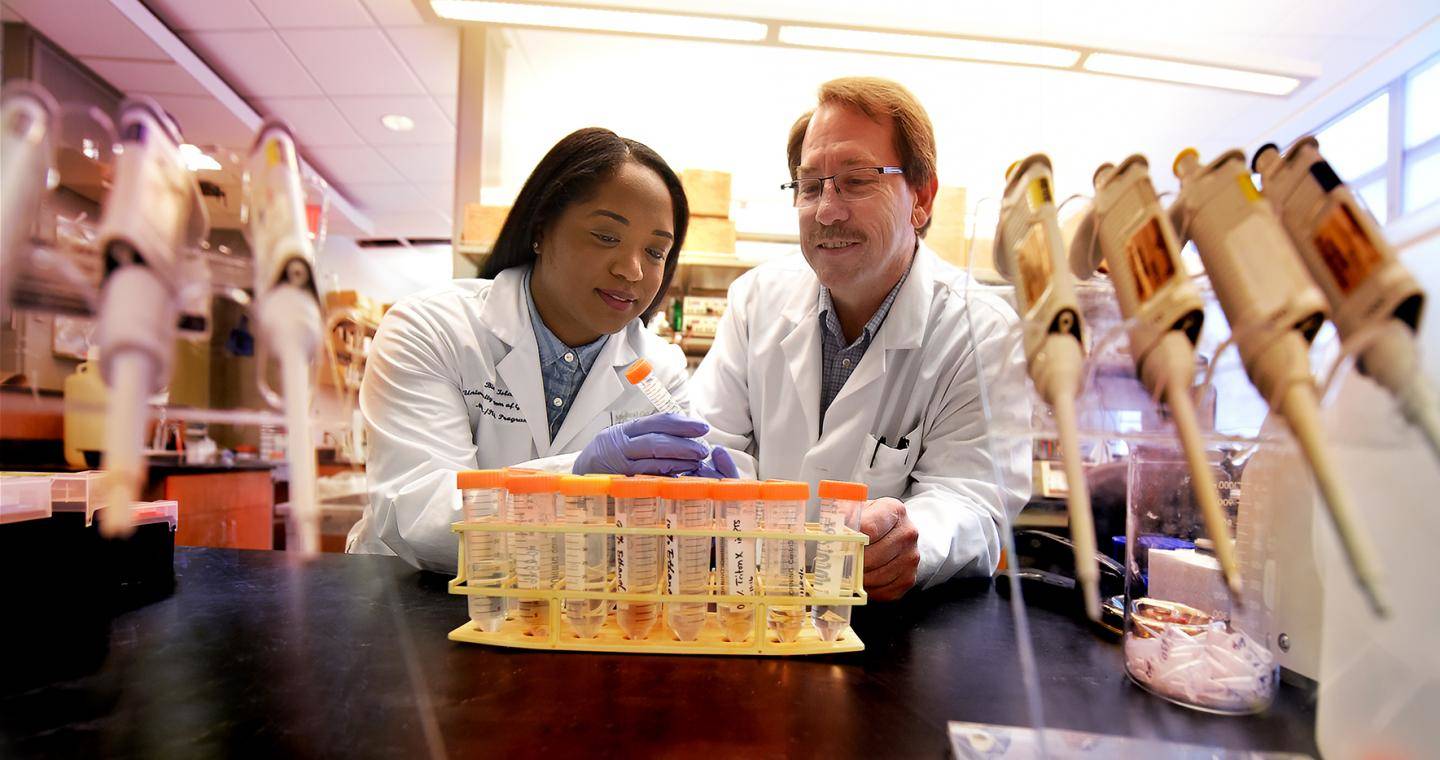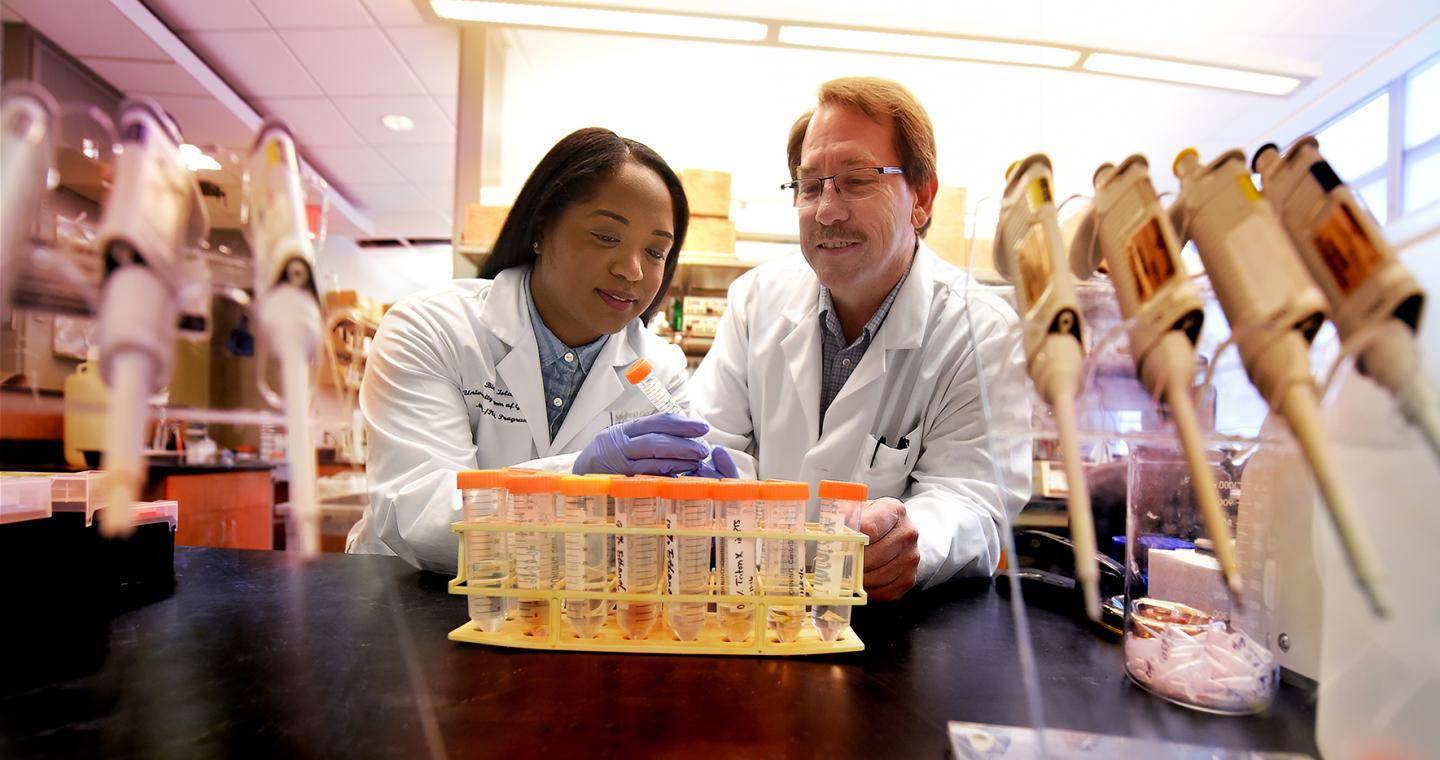
Credit: Phil Jones, Senior Photographer, Augusta University
AUGUSTA, Ga. (March 19 , 2018) – A small, daily dose of Viagra significantly reduces colorectal cancer risk in an animal model that is genetically predetermined to have the third leading cause of cancer death, scientists report.
Viagra cut in half the formation of polyps, an abnormal and often asymptomatic clump of cells on the lining of the intestines that may become cancer, says Dr. Darren D. Browning, cancer researcher at the Georgia Cancer Center and Department of Biochemistry and Molecular Biology at the Medical College of Georgia at Augusta University.
Next steps should include a clinical trial for the drug in patients considered at high risk of colorectal cancer, such as those with a strong family history, multiple previous polyps and chronic intestinal inflammation like colitis, Browning says.
Viagra has been used safely for years in a wide range of doses and age groups, from premature infants with pulmonary hypertension to the elderly with erectile dysfunction, he notes.
When placed in the drinking water, Browning's team found that Viagra reduced polyps in a mouse model with a genetic mutation that occurs in humans, causing them to produce hundreds of polyps starting as teenagers and essentially always resulting in colorectal cancer, says Browning, corresponding author of the study in the journal Cancer Prevention Research.
"Giving a baby dose of Viagra can reduce the amount of tumors in these animals by half," Browning says.
Viagra is best known for its ability to relax the smooth muscle cells around blood vessels so the vessels can more easily fill with blood, which is how it helps both erectile dysfunction and pulmonary hypertension. But Browning's lab is showing it also increases levels of the chemical cyclic GMP, which is known to affect the intestinal lining, called the epithelium.
While the details of just how remain unclear, Browning and his team have seen that the results of increased cyclic GMP include suppression of some of the excessive cell proliferation that occurs in the gut and an increase in normal cell differentiation as well as the natural elimination of abnormal cells, through a process called apoptosis.
"When we give Viagra, we shrink the whole proliferating compartment," says Browning, in an area of our body that directly deals with whatever we put in our mouths and normally experiences high cell turnover "Proliferating cells are more subject to mutations that cause cancer."
Existing polyps were not affected, more evidence that targeting cyclic GMP signaling appears to be a good prevention strategy in high-risk patients, he says.
Viagra is known to inhibit PDE5, a naturally occurring enzyme in colon cells – and other tissues – that breaks down cyclic GMP so there is more of it available to reduce cell proliferation and improve differentiation into cells like the goblet cells that secret protective mucus.
Guanylyl-cyclase C, or GCC, is the primary source of cyclic GMP in the intestinal lining. Mice like those in his study with the genetic predisposition for polyps, were found to have reduced levels of GCC-activating peptides, which are also commonly lost in human colon cancers.
The mice have mutations in the APC – adenomatous polyposis coli – gene, a known tumor suppressor. Like these mice, people with mutations in the APC gene can develop hundreds of polyps in the colon and rectum and are considered at highest risk for colorectal cancer, says Browning of the inherited disorder called familial adenomatous polyposis. The average age at which individuals develop colon cancer is 39, according to the National Institutes of Health.
The scientists also looked at the prescription drug linaclotide, which is used to treat constipation and irritable bowel syndrome with constipation and, like Viagra, is known to increase cyclic GMP. While linaclotide was also effective at significantly reducing polyp formation, the common side effect of diarrhea at pretty much any dose makes it unlikely that patients would find it tolerable to use long term, even to reduce their cancer risk, Browning says. The low doses of Viagra used by humans and in the lab, on the other hand, have no known side effects, Browning notes.
Browning's lab published a paper in July in Cancer Prevention Research that showed Viagra cut polyp formation in half in a mouse model of colitis, an inflammation of the colon and risk factor for colorectal cancer. But in this model as well, they found the drug targeted problems from the genetic mutations, although inflammation also was reduced.
He notes that inflammation is the driver in less than 5 percent of colorectal cancers. About 80 percent form spontaneously when cells in this high-cell turnover area divide and develop a mutation that may support uncontrolled proliferation. Mutations occur most often when we consume carcinogens like those found in processed or over-cooked meats.
###
The research was supported by the National Cancer Institute.
Colorectal cancer is the third most commonly diagnosed cancer in the United States, according to the National Cancer Institute and American Cancer Society. The year, they estimate more than 140,000 new cases and more than 50,000 deaths.
Media Contact
Toni Baker
[email protected]
706-721-4421
@MCG_AUG
http://www.augusta.edu/mcg/





